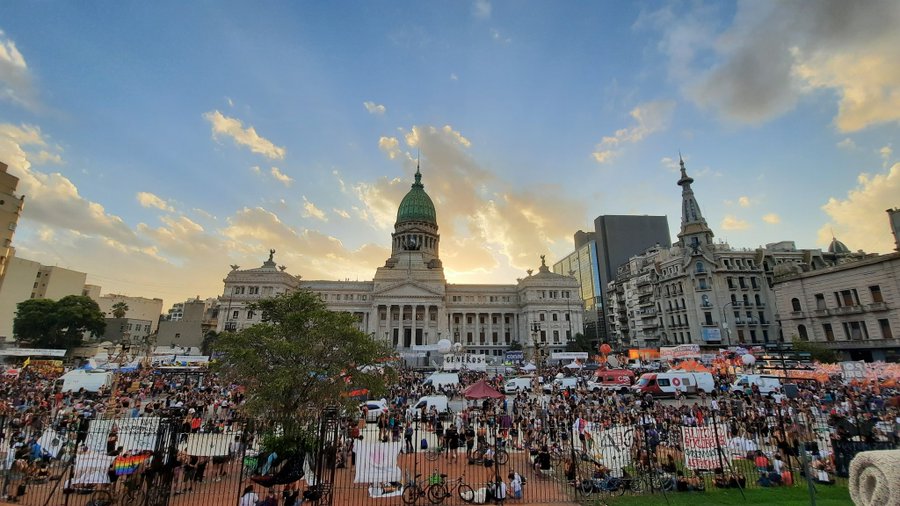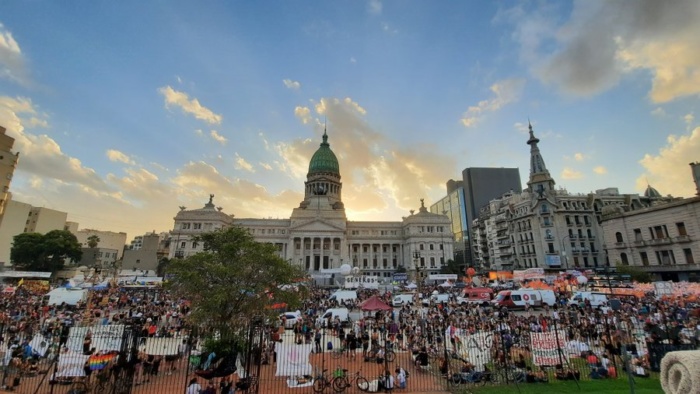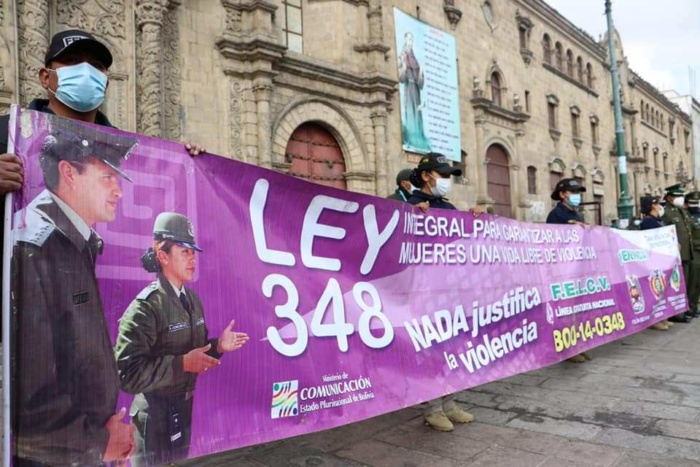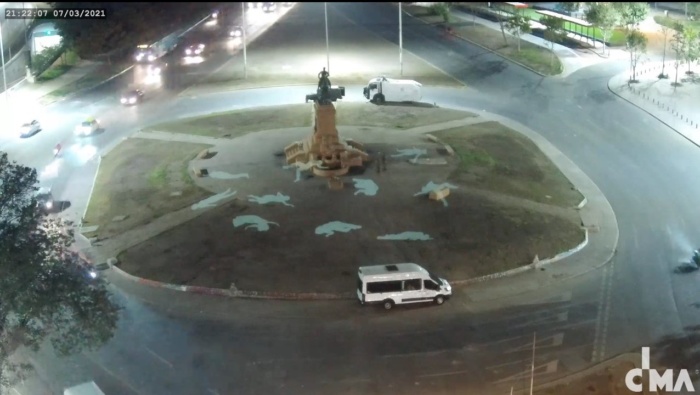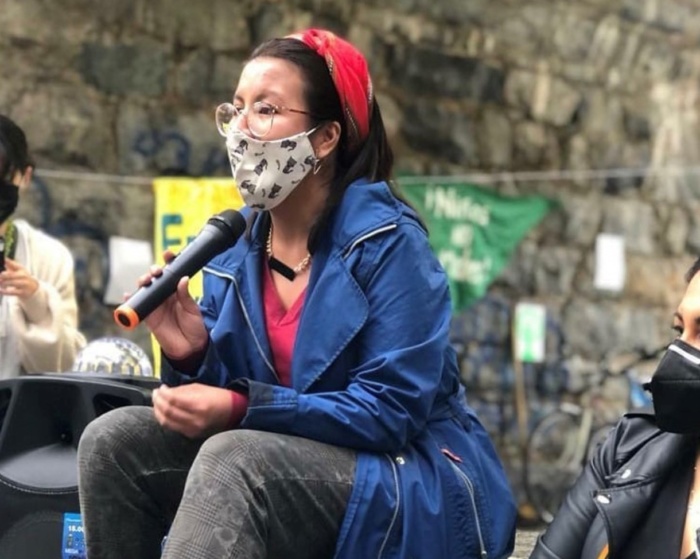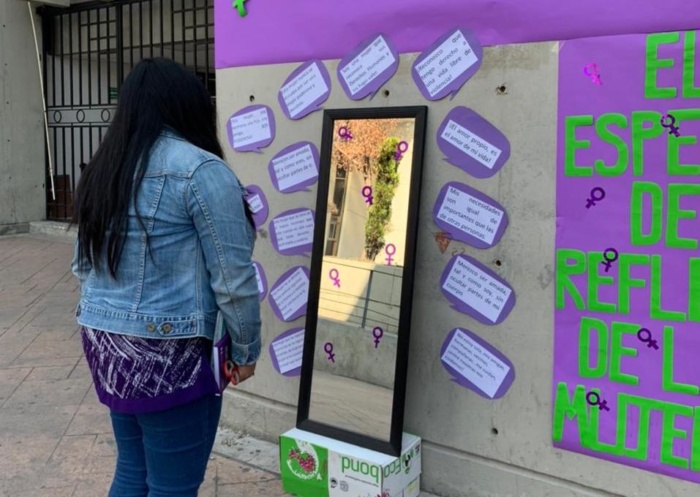Latin America is a dangerous place to be a woman. On International Women’s Day this past Monday 8 March, 2021, women and their allies throughout the region took to the streets to protest against discrimination, inequality and violence against women and girls – especially the alarming number of women violently killed or disappeared. Natasha Tinsley, a volunteer on our Women Resisting Violence project, reports on the celebrations from a handful of different Latin American countries.
Violence against women and girls is an intersectional issue, a tangle of discrimination on grounds of class, ethnicity, gender, sexual orientation, race, physical ability, geographical background and many more social factors. This was made clear in the demands that characterised protests and celebrations this 8M, through placards, performances, songs and dress.
In spite of the Covid pandemic that has swept through Latin American countries this past year, many women bravely joined large-scale national marches and demonstrations, while others participated in important local events organised by women’s groups.
Here is how the day was celebrated in a few different Latin American countries.
Argentina
This was Argentina’s first International Women’s Day since the legalisation of abortion. The national women’s strike was a focal point of the celebration, with tens of thousands marching in Buenos Aires and other main cities. The largest demonstrations took place outside the National Congress and in the Plaza de Mayo.
As Argentinians took to the streets, authorities were busy taking some of the positive actions women had demanded. President Alberto Fernández and provincial governments signed the ‘Federal Agreement for a United Argentina against Gender Violence’, guaranteeing the collaboration of the Federal Council to put a stop to femicides. Admitting the State’s reaction had been “either slow or non-existent”, Fernández assured a quicker response to gender violence cases, increased police training and vowed to make it easier for women to report cases involving members of the security forces.
Bolivia
In Bolivia, protests were not so much about celebration, but rather the urgency of reforming Law 348 (the ‘Law to Guarantee Women a Life Free from Violence’), in force since International Women’s Day in 2013. The law imposes a minimum sentence of 30 years in prison for anyone convicted of femicide. However, real change is yet to be seen. In this year’s protests, Bolivian women have sparked a debate in the national legislature. Talks are underway regarding how the law can be modified to reach its full potential.
In huge marches in La Paz, women demanded justice and the right to legal abortion; and the struggle of the ‘pollera’ women was at the forefront. As the only indigenous representative in President Arce’s cabinet, Bolivia’s Minister of Cultures, Sabina Orellana has been discriminated against for her plaits and traditional dress. Demonstrators highlighted the importance of tackling racism towards indigenous Bolivian women.
In Santa Cruz, women took to the streets in large numbers and violence against the trans community was highlighted.
Brazil
Women from the Casa da Mulher of the Redes de Maré in Rio (a partner organisation in our WRV project) send greetings for International Women’s Day. They also celebrated the anniversary of their organisation, founded on 8 March, 2007.
They state: “More than an homage, we demand respect and equality on International Women’s Day. Redes da Maré was born out of women’s struggle and on this anniversary we stand along with all women to affirm our commitment to the struggle for gender equality, an end to racism and all forms of discrimination”.

Chile
In Santiago’s Plaza de la Dignidad, protestors got creative. Women paraded with patchwork blankets in homage to missing women and the streets echoed with chants of injustice, including in a collective performance of Violeta Parra’s ‘Arauco tiene una pena’.
Meanwhile, on the Alameda, Santiago’s main avenue, Mapuche women marched to take a stand for indigenous women’s rights. As night fell, female solidarity continued to grow as crowds gathered to see a new performance from Las Tesis, one of Chile’s most famous feminist groups. Armed police cars ironically fired water canons while driving over huge ‘NOS MATAN’ (‘they’re killing us’) graffiti.
Colombia
In Bogotá, the Colombian government decorated the capital’s bus rapid transit system, TransMilenio, with the fights and conquests of women throughout history. The city’s mayor, Claudia López, also took to Twitter to share her support. Alongside a photo that read, “how loudly do we have to shout to make you react? Don’t let one more woman die”, López highlighted the “new opportunity” for women’s demands to be heard and called for the day to be conducted with “joy and tranquillity.”
Members of Colombia’s Secretariat for Women organised and participated in artistic and cultural activities, including a feminist mural workshop and a poster-making workshop celebrating women.
While many Colombian women celebrated their freedom, others declared 8M as a ‘day of national mourning for femicides’. Women in Medellín performed a funeral procession in honour of Colombian women killed due to gender-based violence. Alongside the black coffin, the memorial plaque reads, “630 victims of femicide from January 2020 to 18 February, 2021. They died because they were women.”
Ecuador
On 6 March, the ‘Vivas Nos Queremos’ (‘We Want Ourselves Alive’) bridge, a symbol of the fight against machismo in Cuenca, was vandalised. The bridge’s commemorative plaque for femicide victims was replaced with a derogatory poster, threatening young activist Liz Zhingri. In an act of solidarity, women gathered to listen to Zhingri as she discussed the struggle for indigenous women in Cuenca.
A key message in Ecuador was, ‘Ni flores, ni chocolates, queremos igualdad de derechos’ (‘We don’t want flowers or chocolate, we want equal rights’). This was expressed through the arts: Blanca Chancosa, a key leader of Ecuador’s indigenous movement, introduced an ancestral ceremony near the National Electoral Council headquarters, demanding women’s rights to land, education, and health. In Quito, women performed a batucada.
Nicaragua
To commemorate IWD, the Matagalpa Women’s Collective organised a forum in which they collectively expressed their hopes for Nicaragua. Different activities, exhibitions and performances were organised throughout the day. They stated: “We continue to resist for the Nicaragua we want to live in”.
Mexico
Staff at the ‘LUNAS’ organisation, founded by Mexico’s Secretariat for Women, offered advice and pamphlets outside help centres. They set up a ‘women’s recognition mirror’ to generate greater visibility of the role of the women.
A ‘¡Ni Una Más!’ monument installed in Morelia by government organisation, Municipal Institute of Women for Substantive Equality (IMUJERIS), invited residents to reflect on gender violence and the history behind International Women’s Day.
In anticipation of the 8 March celebrations, President Andrés Manuel López Obrador (AMLO) ordered the erection of a 10-foot-high metal wall to shield the National Palace. Protestors used it as a canvas to display the names of those lost to femicide. Read the full story here.



